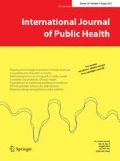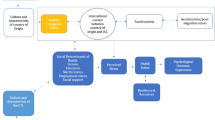Abstract
Objectives
Based on a cross-sectional population survey of 3,129 women with minor children, it was analyzed how socioeconomic status, family structure and perceived psychosocial stress are linked and how they contributed to women’s self-reported depressive symptoms.
Methods
Pearson’s χ2 test and multi-factor analysis of variance were used for investigating relationships between social status, family characteristics and psychosocial stress. Logistic regression models were computed for estimating their impact on depressive symptoms.
Results
Mothers having more than two children, early mothers and single mothers were prone to socioeconomic disadvantages. Low income was associated with higher psychosocial stress, however also an inverse social gradient was found indicating increased psychosocial stress among higher educated mothers. Having a youngest child below 16 years and low income increased while being a housewife was associated with decreased risks of depressive symptoms. Psychosocial stress, in particular due to family demands, conflicts with (former) partner and loneliness revealed to be highly relevant for depressive symptoms.
Conclusions
The findings are pointing to the importance of life-phase specific stressors for explaining depressive symptoms among mothers.
Similar content being viewed by others
References
Arber S (1997) Comparing inequalities in women’s and men’s health: Britain in the 1990s. Soc Sci Med 44:773–787
Artazcoz L, Artieda L, Borrell C, Cortes I, Benach J, Garcia V (2004) Combining job and family demands and being healthy: What are the differences between men and women? Eur J Public Health 14:43–48
Bell D, Dill D, Longfellow C, Makosky V (1988) Stressful life conditions and the mental health of mothers. In: Russo N (Chair) Women and depression: research gaps and priorities. Symposium presented at the Annual Meeting of the American Psychological Association, Atlanta
Campo JV, Bridge J, Lucas A, Savorelli S, Walker L, Di Lorenzo C et al (2007) Physical and emotional health of mothers of youth with functional abdominal pain. Arch Pediatr Adolesc Med 161:131–137
Curtis L, Phipps S (2004) Social transfers and the health status of mothers in Norway and Canada. Soc Sci Med 58:2499–2507
Deal LW, Holt VL (1998) Young maternal age and depressive symptoms: results from the 1988 National Maternal and Infant Health Survey. Am J Public Health 88:266–270
Drever F, Doran T, Whitehead M (2004) Exploring the relation between class, gender, and self rated general health using the new socioeconomic classification. A study using data from the 2001 census. J Epidemiol Community Health 58:590–596
Emerson E, Hatton C, Llewellyn G, Blacker J, Graham H (2006) Socio-economic position, household composition, health status and indicators of the well-being of mothers of children with and without intellectual disabilities. J Intellect Disability Res 50:862–873
Fokkema T (2002) Combining a job and children: contrasting the health of married and divorced women in the Netherlands? Soc Sci Med 54:741–752
Franz M, Lensche H, Schmitz N (2003) Psychological distress and socioeconomic status in single mothers and their children in a German city. Soc Psychiatry Psychiatr Epidemiol 38:59–68
Gadalla TM (2009) Determinants, correlates and mediators of psychological distress: a longitudinal study. Soc Sci Med 68:2199–2205
Gehring TM, Aubert L, Padlina O, Martin-Diener E, Somaini B (2009) Perceived stress and health-related outcomes in a Swiss population sample. Swiss J Psychol 60:27–34
Graham H (2007) Unequal lives: health and socioeconomic inequalities. Open University Press, Maidenhead
Graham H, Sherburne Hawkins S, Law C (2010) Lifecourse influences on women’s smoking before, during and after pregnancy. Soc Sci Med 70:582–587
Herrmann Ch, Buss U, Snaith RP (1995) HADS-D—Hospital Anxiety and Depression Scale—Deutsche Version: Ein Fragebogen zur Erfassung von Angst und Depressivität in der somatischen Medizin. Hans Huber, Bern
Hinz A, Schwarz R (2001) Angst und Depression in der Allgemeinbevölkerung. Eine Normierungsstudie zur Hospital Anxiety and Depression Scale. Psychotherapie, Psychosomatik und Medizinische Psychologie (PPmP) 51:193–200
Khlat M, Sermet C, Le Pape A (2000) Women’s health in relation with their family and work roles: France in the early 1990s. Soc Sci Med 50:1807–1825
Kuh D, Power C, Blane D, Bartley M (2004) Socioeconomic pathways between childhood and adult health. In: Kuh D, Ben-Shlomo Y (eds) A life course approach to chronic disease epidemiology: tracing the origins of ill health from early to adult life. Oxford University Press, Oxford, pp 371–395
Lahelma E, Arber S, Kivel K, Roos E (2002) Multiple roles and health among British and Finnish women: the influence of socioeconomic circumstances. Soc Sci Med 54:727–740
Macran S, Clarke L, Joshi H (1996) Women’s health: dimensions and differentials. Soc Sci Med 42:1203–1216
Martikainen P (1995) Women’s employment, marriage, motherhood and mortality: a test of the multiple role and role accumulation hypotheses. Soc Sci Med 40:199–212
Mastekaasa A (2000) Parenthood, gender and sickness absence. Soc Sci Med 50:1827–1842
Mathiesen KS, Tambs K, Dalgard OS (1999) The influence of social class, strain and social support on symptoms of anxiety and depression in mothers of toddlers. Soc Psychiatry Psychiatr Epidemiol 34:61–72
Matthews S, Power C (2002) Socio-economic gradients in psychological distress: a focus on women, social roles and work-home characteristics. Soc Sci Med 54:799–810
McConnell D, Llewellyn G (2006) Health of mothers of school-age children with disabilities. Aust N Z J Publ Health 30:572–574
McDonough P, Walters V, Strohschein L (2002) Chronic stress and the social patterning of women’s health in Canada. Soc Sci Med 54:767–782
Mirowsky J, Ross CE (2002) Depression, parenthood, and age at first birth. Soc Sci Med 54:1281–1298
Mistry R, Stevens GD, Sareen H, De Vogli R, Halfon N (2007) Parenting-related stressors and self-reported mental health of mothers with young children. Am J Public Health 97:1261–1268
Naerde A, Tambs K, Mathiesen KS, Dalgard OS, Samuelsen SO (2000) Symptoms of anxiety and depression among mothers of pre-school children: effect of chronic strain related to children and child care-taking. J Affect Disord 58:181–199
Power S, Stansfeld A, Matthews S, Manor O, Hope S (2002) Childhood and adulthood risk factors for socio-economic differentials in psychological distress: evidence from the 1958 British birth cohort. Soc Sci Med 55:1989–2004
Romito P, Saurel-Cubizolles MJ, Lelong N (1999) What makes new mothers unhappy: psychological distress one year after birth in Italy and France. Soc Sci Med 49:1651–1661
Sacker A, Firth D, Fitzpatrick R, Lynch K, Bartley M (2000) Comparing health inequality in men and women: prospective study of mortality 1986–96. BMJ 320:1303–1307
Scheier MF, Carver CS, Bridges MW (1994) Distinguishing optimism from neuroticism (and trait anxiety, self-mastery, and self-esteem): a re-evaluation of the Life Orientation Test. J Pers Soc Psychol 67:1063–1078
Sperlich S, Arnhold-Kerri S, Geyer S (2011) Social living conditions and health among mothers in Germany: findings from a population sample. Bundesgesundheitsblatt Gesundheitsforschung Gesundheitsschutz 54:735–744
Stronks K, van de Mheen H, Looman CWN, Mackenbach JP (1998) The importance of psychosocial stressors for socio-economic inequalities in perceived health. Soc Sci Med 46:611–623
Walters V, McDonough P, Strohschein L (2002) The influence of work, household structure, and social, personal and material resources on gender differences in health: an analysis of the 1994 Canadian National Population Health Survey. Soc Sci Med 54:677–692
Whitehead M, Burström B, Diderichsen F (2000) Social policies and the pathways to inequalities in health: a comparative analysis of lone mothers in Britain and Sweden. Soc Sci Med 50:255–270
Acknowledgments
This study was funded by the German Research Association (DFG) under Grant Number GE 1167/7-1.
Author information
Authors and Affiliations
Corresponding author
Additional information
This paper belongs to the special issue “Monitoring Social Determinants of Health”.
Rights and permissions
About this article
Cite this article
Sperlich, S., Arnhold-Kerri, S. & Geyer, S. What accounts for depressive symptoms among mothers? The impact of socioeconomic status, family structure and psychosocial stress. Int J Public Health 56, 385–396 (2011). https://doi.org/10.1007/s00038-011-0272-6
Received:
Accepted:
Published:
Issue Date:
DOI: https://doi.org/10.1007/s00038-011-0272-6




